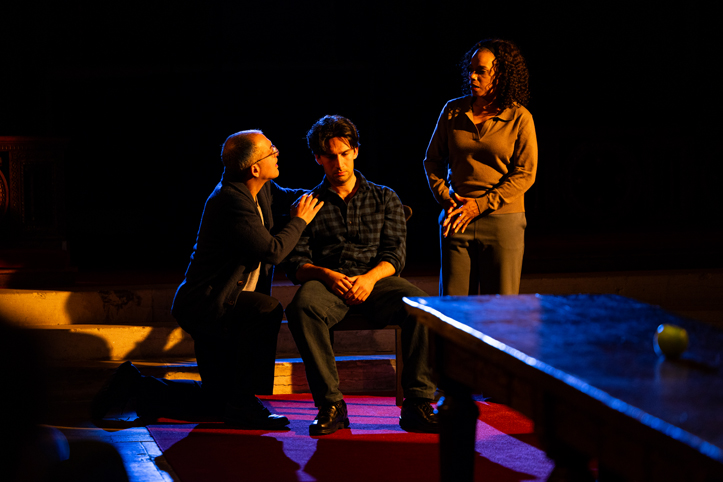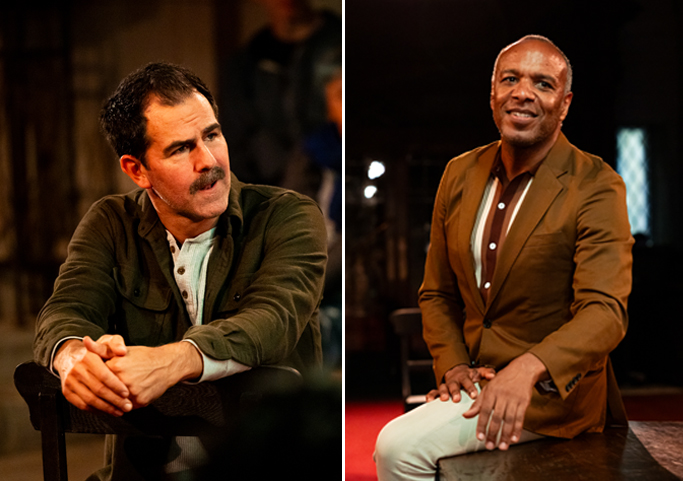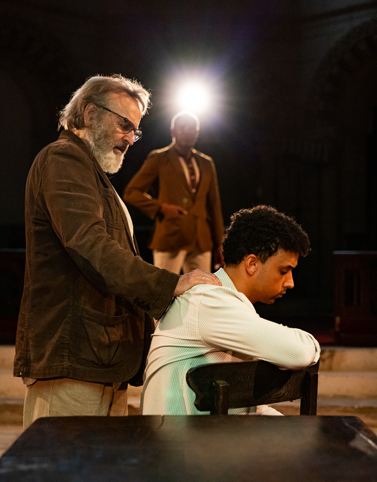By Alix Cohen
In 1935, New York Times reviewer Brooks Atkinson found Awake and Sing! a story of “noisy, lunging humanity” he felt was weighted by character development, but promising. Sea Dog Theater presents the originally three act play in a dense, one-act, hour forty-five performance. Action is compressed which helps balance.
It’s the height of the Great Depression, marked by widespread economic hardship and social unrest. The Berger family—an impoverished Jewish household—live together in a cramped Bronx apartment.

Juan Carlos Diaz (Myron), Sina Pooresmaeil (Sam), Debra Walton (Bessie)
Matriarch Bessie (Debra Walton) is an exhausted tyrant, imposing rules and values in accordance with her own traditional principles as well as family survival. Husband Myron (Juan Carlos Diaz) is sweet and ineffectual. Dad Jacob (Gary Sloan), a wise old Marxist who listens to Caruso records, watches over grandson, Ralph/Ralphie (Trevor McGhie.)
The boy longs for a larger life, but doesn’t know what or how to begin. He has a secret girlfriend mom thinks is below him. Ralphie works at Uncle Morty’s (Alfred C. Kemp) successful dress business. His boss is selectively generous and optimistic as only a rich man without stocks can be. Side dealings pad income.
When rebellious daughter Hennie (Daisy Wang) is made pregnant by a man she won’t identify, Bessie expeditiously marries her off to quiet, decent Sam (Sina Pooresmaeil) who actually loves her. Unfortunately, former boyfriend Moe (Christopher J. Domig), a bitter army veteran now racketeer, is finally ready to declare himself.

Christopher J. Domig (Moe); Alfred C. Kemp (Morty)
Clifford Odets was an unqualified Lefty. Jacob’s speeches echo the rhetoric of class struggle, while Moe Axelrod’s cynicism reflects the disillusionment of a wounded veteran. The younger characters—Ralph and Hennie—yearn for autonomy and meaning, pushing against the older generation’s compromises. Themes of survival, generational conflict, and the tension between idealism
and pragmatism run through the excellent, realistic play.
Of the players, Gary Sloan’s Jacob is the most credible. The role was originated by Morris Carnovsky of whom we see reflections. Trevor McGhie (Ralphie) is understated and believably fraught, so much so that it’s impossible to comprehend his decision at the end of the play- as Odets intended. Sina Pooresmaeil (Sam) is effectively low key and vulnerable. A slight Eastern European accent works. Alfred C. Kemp’s Morty is larger than life and convincingly crooked. Christopher J. Domig (Moe) has his moments.
Unfortunately, Director Erwin Maas does not imbue the play with the Judaism it depicts. The company is a United Nations of blind casting, which works against it. Inflection, especially idiomatic, is poor. Accepting a single family of White, Chinese, African American, and Spanish, the latter marrying an East Indian, is too much of a stretch.

Gary Sloan (Jacob & Trevor McGhie (Ralphie)- background- Alfred C. Kemp (Morty)
Other issues are focus – when one actor speaks and many listen, there’s no registration of thought among them- and use of televisions employed to show characters after they leave the room. Learning no new information this way makes screens distract, rather than add.
The very narrow room has seating on both long sides at the center. I understand using the doorway far right, but we’re unable to see and indistinctly hear too much action that happens in its vicinity. Anything that goes on near the elaborate, old, center table lands well, as does use of left hand (nave) steps.
Ralph’s final cry, “Awake and sing, ye that dwell in dust!” is both a biblical invocation and a call to action. The socially conscious drama resonates.
Photos by Jeremy Varner
Opening: Ralph/Ralphie (Trevor McGhie)
Sea Dog Theater presents Awake and Sing! By Clifford Odets
Directed by Erwin Maas
Through November 8, 2025
Tuesday, Wednesday, Friday, and Saturday at 7:30pm.
Sea Dog Theater – Stories of Alienation and Reconciliation
https://www.seadogtheater.org/
209 East 16th Street


